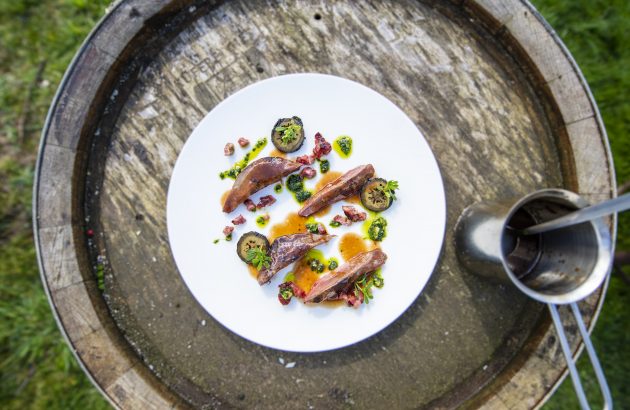Game is in the spotlight thanks to British Game Week and Britain's healthy crop of chefs extolling its virtues
British Game Week kicks off on 7 November but there is an increasing band of chefs that needs no convincing about the merits of game. From Skye to Soho, it is being hailed by a new generation of foodies and restauranteurs, while game’s established champions now have even more reason to shout about its merits.
Richard Gladwin loves squirrel. “If you haven’t tried it, you should,” he says, declaring it delicious spatchcocked and barbecued but even better skinned, cured, confit and used as a filling for a delicate tortellini poached with wild mushrooms, cobnuts and nettle pesto. We might think of it as traditional fare but game and wild food – in all its guises – is having a moment.
Local and wild
Gladwin, with his two brothers, has six London-based restaurants, each celebrating the English countryside, with “local and wild” as their tagline. The brothers grew up on a West Sussex farm and thrive on being part of that rural community. “Gathering anything from the land has always been a way of life for us,” says Gladwin, who as a youngster tried a Roald Dahl-esque trick of scattering booze-soaked raisins on the floor of woodland in the hope the pheasants would simply drop off their perches. “The ‘local and wild’ restaurants have been built on these childhood memories. The chefs who come to work with us are extremely excited about cooking with game, while the guests who try it love it, although I think we are still a way off the day when a partridge or pheasant outsells a chicken dish, which is a shame.”

The Gladwin brothers grew up living off the land and eating game
Callum Bowmer, award-winning chef at Horto at Rudding Park in North Yorkshire, believes the current state of the world might see more consumers turning to game. “With concerns over shortages of chicken, beef and some fish, game might become an option that was previously overlooked,” he says. “But I hope people start eating game not because they have to but because they try it and discover how amazing it is. When my butcher shows me a saddle of wild venison with a nice fat cap from the rutting season that has been salt-aged for two weeks, it’s hard not to get excited. I can get some cracking wild venison from my butcher in autumn and know at that time there won’t be another bit of protein that can beat it.”
Childhood days spent in Lincolnshire roaming around his grandfather’s farm rough shooting and beating laid the foundations for Bowmer’s culinary career. “I shot my own pigeon for my very first cooking competition, Yorkshire Young Chef of the Year,” he recalls. “Later, when I entered Chef of the Year at the CLA Game Fair, I prepared venison with pickled walnuts, chard and truffle, which secured me second place.
Better for you, better for the planet
“Guests come to Horto to experience new ingredients and flavour combinations, and the game is almost universally well received. I’m also heartened by how much more people consider the provenance of food and its environmental impact. What’s better for you and the planet? A beautiful bit of locally shot duck or pheasant? Or chicken breast from somewhere in Europe injected with preservatives and water to make it look plump?”
Aaron Patterson is chef director of Hambleton Hall in Rutland, holder of the longest-retained Michelin star in the UK and one of the country’s best-known champions of game. “A perfectly hung pheasant is very special and should be celebrated as a fantastic local ingredient,” he says. “It can be found in abundance in many areas of the UK between October and the end of January, and costs little, as well as being versatile and sustainable.”
According to Patterson, ingredients and preparation are key: “I would compare a pheasant that hasn’t been hung for a week to eating an underripe pear – disappointing.” His menus are written daily once he knows what has come to the back door, after which creations might include grouse with blackberry sauce, roast mallard with corn, or pheasant with Jerusalem artichoke. As a keen Shot and fisherman, a lot of his ideas start at home, trying out new flavours and techniques with whatever he has caught or shot. “I find this sort of eating experience one of the most satisfying: it really is field and river to plate.”
Field to fork
Undeniably the rise of the ‘field-to-fork’ mantra for on-trend dining is helping to focus a spotlight on game. “I absolutely love it,” enthuses Darren Broom, head chef at Pythouse Kitchen Garden in Wiltshire, an establishment founded on sustainable growing and cooking. “Game is full of provenance, nutrition and flavour. Served with foraged wild mushrooms and hedgerow fruits, for me it doesn’t get much better. Game is incredibly versatile and appears on our menu as and when the different species are available. We use as much of the whole animal as we possibly can here. For example, last year we cured, smoked and dried venison hearts to create a seasoning. These were grated over dishes, a little like a bottarga but with a rich, earthy flavour. The offal, shoulders and trim are used for faggots or sausages. We like to use less conventional cuts also. Venison Barnsley chops are always a real hit; venison osso bucco too.”

Darren Broom, head chef at Pythouse Kitchen Garden, champions field-to-fork dining
Broom’s partner Zara Whitfield has shot competitively. She and the couple’s three spaniels are a regular sight at local shoots. “It isn’t something I grew up with, unlike Zara, but it is a wonderful thing to learn about,” he says. “We were lucky enough to work with Rachel Carrie on her book Game & Gatherings, which gave me a really fascinating insight into fieldsports.”
Such a book might never be published in India, where hunting is banned on conservation grounds. Vivek Singh, chef of the Cinnamon Club, admits to being “beyond myself” when he realised he could put game on the menu here in the UK. “The punishment for doing so in India was life, so learning to cook, there was no game to be had. But, joking aside, as a chef, having game on my menu is an opportunity for me to revisit, reinvent and reimagine a genre that has otherwise been lost in Indian cooking.”
Quintessentially British fare spiced up
With dishes such as tandoor-cooked venison served with pickled fruits and vegetables, and roast partridge served on a bed of earthy black lentils, the Cinnamon Club has built a strong reputation for cooking quintessential British fare with Indian spices and ingredients. “Most gamebirds, including partridge, grouse and pheasant, handle spice really well. My favourite is smoked grouse breast with my mum’s pumpkin chutney,” reveals Singh. “I would encourage anyone to experiment by adding flavours such as coriander and chilli into a marinade before roasting.”
For Scott Davies, head chef at The Three Chimneys on the Isle of Skye, partridge is the ideal introduction to game. “It has a beautiful texture, is white meat and has just a light hint of richness that doesn’t overpower or intimidate. I like to serve it with pear. I admit the idea of the partridge in the pear tree makes me smile, but it isn’t a gimmick – pears are in season the same time and I’m a staunch believer in the idea that what grows together goes together.”
Davies serves an array of game not just to his customers but also to his staff. “A pheasant feeds two or three people and is really good value. We often serve it and other game at our staff teas. Not only is a pheasant inexpensive, but you know it has lived a good life. It would be hard to find such a tasty, free-range chicken for that price,” he insists. One of his favourite foods is rabbit. “My father is Welsh and grew up rabbiting. It’s a tradition we carried on when we moved to Scotland. Rabbit is rich in vitamin E and I’m always surprised at how popular it is on the menu. I think rabbit is typical of lots of game: people enjoy eating it and will order it in a restaurant but wouldn’t think to cook it at home.”
According to Davies, a lack of confidence and know-how is to blame: “The demise of the small, local butcher has been such a loss. They have a much wider selection of meats and cuts, and also are able to offer their customers real expertise and advice. Such places are increasingly hard to find.” He also accepts that there is some reluctance to eat game that resembles Thumper and Bambi.
Help deal with Britain’s deer problem
“I think Britain needs to get the message with deer that we have a real problem with overpopulation. Eating venison is a brilliant way of dealing with it. “Here in Scotland, you can start shooting red deer stags from 1 July and from that time onwards venison appears on our menu. We have just red deer here on Skye. We use the whole animal: game pies, faggots from the offal and delicious stocks from the bones. It is healthy and super versatile: you can have venison tartare and carpaccio, eat it pink but also slow cook it.”
The Freemasons at Wiswell has an abundance of game within a 50-mile radius. Chef and owner of this Ribble Valley eatery is Steven Smith. He agrees that chefs play an important role in gently correcting misconceptions about game. “Our job is very much to break down the barriers. Game is seen as a manly, red meat and very traditional. To some extent this is true, but it is also super healthy and very modern in terms of sustainability and minimal food miles. Creatively, we also need to make our food accessible,” he believes.

Guests enjoying the game and glorious hospitality of The Freemasons at Wiswell
“Although we pride ourselves on serving some of the first grouse to be eaten on the Glorious Twelfth, I’m mindful that nobody wants a really heavy meal in the middle of summer when it’s stonking hot. We balance the richness of the meat with new-season, super-sweet sweetcorn and the fresh cherries that are also in season. “We very much serve what our local contacts bring to us. We are lucky to have an abundance of gamebirds and it is wonderful to be able to showcase the best of the British countryside. In some cases, it isn’t for the faint-hearted. We tend to serve our woodcock the traditional way with brains on toast, but there is always a fish option, even on the Glorious Twelfth,” he says with a smile.
Interested in cooking game for yourself? Try some of your favourite game recipes during British Game Week.





